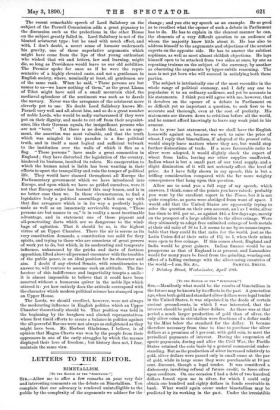LETTERS TO THE EDITOR.
BIMETALLISM.
ITO THE EDITOR OP THE "SPECTATOR."] SIR,—Allow me to offer a few remarks on your very fair and interesting comments on the debate on Bimetallism. You complain that our advocacy is rendered unintelligible to the public by the complexity of the arguments we adduce for the change ; and you cite my speech as an example. Be so good as to recollect what the opener of such a debate in Parliament has to do. He has to explain in the clearest manner he can, the elements of a very difficult question to an audience of whom the majority know little about it. He has also to address himself to the arguments and objections of the a-cutest experts on the opposite side. He has to answer the subtlest sophisms, as well as meet almost childish objections. He lays himself open to be attacked from two sides at once, by one as repeating truisms on the subject of the currency, by another as obscuring the arguments by hyper-subtle reasoning. The man is not yet born who will succeed in satisfying both these parties.
The subject is intrinsically one of the most recondite in the whole range of political economy, and I defy any one to popularise it to an ordinary audience, and yet be accurate in his statements. I think you will agree with me, however, that it devolves on the opener of a debate in Parliament on so difficult yet so important a question, to seek first to be accurate and thorough, even at the cost of prolixity. His statements are thrown down to criticism before all the world, and he cannot afford knowingly to leave any weak joint in his armour.
As to your last statement, that we shall have the English housewife against us, because we seek to raise the price of wheat, I reply that bimetallism, if adopted at the present ratio, would simply leave matters where they are, but would stop further dislocations of trade. If a more favourable ratio to silver were adopted, it would slightly check the export of wheat from India, leaving our other supplies unaffected. Indian wheat is but a small part of oar total supply, and a alight diminution of it will not seriously affect the level of price. As I have fully shown in my speech, this is but a trifling consideration compared with the far more weighty consequences that hang upon this question.
Allow me to send you a full copy of my speech, which answers, I think, some of the points you have raised ; probably you went by the excellent report in the Times, but it is not quite complete, as parts were abridged from want of space. I would add that the United States are apparently trying to solve the question on their own account, and as I write, silver has risen to 48d. per oz., as against 44d. a few days ago, merely on the prospect of a large addition to the silver coinage. Were they ultimately to adopt free unlimited coinage of both metals at their old ratio of 16 to 1, it seems to me by no means impro- bable that they could fix that ratio for the world, just as the Latin Union did at their ratio of 15. to 1, when their mints were open to free coinage. If this comes about, England and India would be great gainers. Indian finance would be as prosperous as that of England is at present, and Lancashire would for many years be freed from the grinding, wearing-out effect of a falling exchange with the silver-using countries of






































 Previous page
Previous page